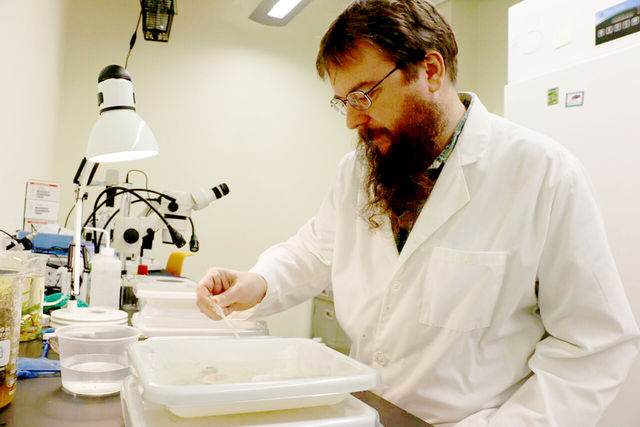KOKEE — Scientists are testing what they’re calling “mosquito birth control” to stop a major threat to Hawaii’s most rare endangered birds. The procedure is known as the Incompatible Insect Technique, where bacteria is injected into male mosquitoes that prevents
KOKEE — Scientists are testing what they’re calling “mosquito birth control” to stop a major threat to Hawaii’s most rare endangered birds.
The procedure is known as the Incompatible Insect Technique, where bacteria is injected into male mosquitoes that prevents them from being able to produce offspring.
“The process for mosquitoes is very similar to techniques that have been used for many decades in Hawaii to control pest fruit flies for the benefit of agriculture,” said Cynthia King, an entomologist with DLNR/DOFAW.
She continued: “It doesn’t eradicate the insect, but it helps to safely reduce the population on a landscape scale without the use of pesticides and without harming other species.”
Those involved with endangered and invasive species on Kauai said it could be a good thing for the birds, which are edging closer toward extinction with rising temperatures sending the mosquito line to higher elevations.
Mosquitoes spread avian malaria, avian pox and other vector-borne diseases that are contributing to declining bird populations.
“We are already seeing the loss on Kauai of the safe havens of higher elevation forests for our native birds,” King said. “Mosquito-spread diseases are decimating bird populations and if we do nothing we could lose several more species in the next 10 years.”
Wednesday, representatives from the Department of Land and Natural Resources’ Division of Forestry and Wildlife announced they’ve teamed up with the U.S. Fish and Wildlife Service to fund the research, which is being conducted by University of Hawaii scientists.
The research is in the beginning stages and will be done in a laboratory setting — no mosquitoes are being released into the wild. It involves giving the male mosquitoes a different strain of a bacteria, Wolbachia, that’s normally found in them.
Mosquitoes carry a type of Wolbachia in their system in order to reproduce, but when a male with a different strain of the bacteria tries to mate with females, there are no offspring.
Bill Lucy, of Kauai Invasive Species Committee, said the group met with US Fish and Wildlife earlier this year in scoping meetings about the topic.
“What it would do for the birds would be an incredible turnaround,” he said.
Lisa “Cali” Crampton, of Kauai Forest Bird Recovery Project, said it’s particularly important for saving Kauai’s honeycreepers.
“The honeycreepers in general don’t have a lot of immunity to avian malaria,” Crampton said.
Of the six honeycreeper species on Kauai, two are endangered — the ‘akikiki and the ‘akeke’e, and the ‘I’iwi is expected to be listed as endangered in the near future.
“’I’iwi is declining rapidly and they’re probably the most susceptible to avian malaria,” Crampton said.
Within the past 12 years, the population of ‘akeke’e on Kauai has declined 98 percent and there are under 1.000 individuals in the population.
“We haven’t detected any noticeable signs of resistance to avian malaria, it’s their number one threat,” Crampton said.
In fact, the only member of the honeycreeper family on Kauai that’s fighting back against avian malaria is the ‘amakihi, which seems to be developing a degree of resistance.
“But, it’s not clear to what extent and it’s not in all of the honeycreepers,” Crampton said.
Because mosquito-borne avian malaria is a substantial threat to the honeycreeper population, Crampton said it’s imperative to control the insects.
“There’s no time to waste,” Crampton said. “Really, either they have to develop resistance or we have to control the mosquitoes — otherwise we’ll have vanishingly few birds left.”


